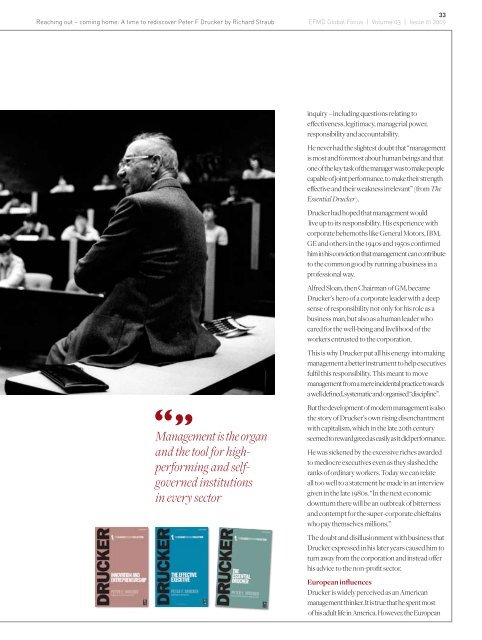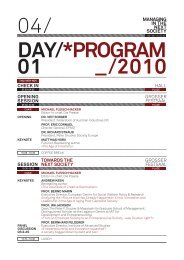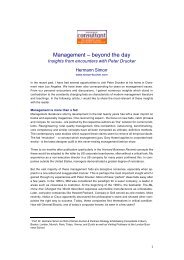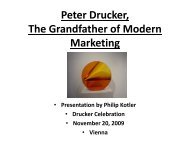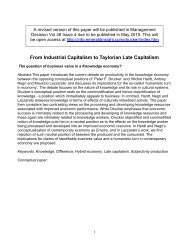Download PDF-Version (469 k) - Peter Drucker Society of Austria
Download PDF-Version (469 k) - Peter Drucker Society of Austria
Download PDF-Version (469 k) - Peter Drucker Society of Austria
You also want an ePaper? Increase the reach of your titles
YUMPU automatically turns print PDFs into web optimized ePapers that Google loves.
33<br />
Reaching out – coming home: A time to rediscover <strong>Peter</strong> F <strong>Drucker</strong> by Richard Straub EFMD Global Focus | Volume 03 | Issue 01 2009<br />
Management is the organ<br />
and the tool for highperforming<br />
and selfgoverned<br />
institutions<br />
in every sector<br />
inquiry – including questions relating to<br />
effectiveness, legitimacy, managerial power,<br />
responsibility and accountability.<br />
He never had the slightest doubt that “management<br />
is most and foremost about human beings and that<br />
one <strong>of</strong> the key task <strong>of</strong> the manager was to make people<br />
capable <strong>of</strong> joint performance, to make their strength<br />
effective and their weakness irrelevant” (from The<br />
Essential <strong>Drucker</strong>).<br />
<strong>Drucker</strong> had hoped that management would<br />
live up to its responsibility. His experience with<br />
corporate behemoths like General Motors, IBM,<br />
GE and others in the 1940s and 1950s confirmed<br />
him in his conviction that management can contribute<br />
to the common good by running a business in a<br />
pr<strong>of</strong>essional way.<br />
Alfred Sloan, then Chairman <strong>of</strong> GM, became<br />
<strong>Drucker</strong>’s hero <strong>of</strong> a corporate leader with a deep<br />
sense <strong>of</strong> responsibility not only for his role as a<br />
business man, but also as a human leader who<br />
cared for the well-being and livelihood <strong>of</strong> the<br />
workers entrusted to the corporation.<br />
This is why <strong>Drucker</strong> put all his energy into making<br />
management a better instrument to help executives<br />
fulfil this responsibility. This meant to move<br />
management from a mere incidental practice towards<br />
a well defined, systematic and organised “discipline”.<br />
But the development <strong>of</strong> modern management is also<br />
the story <strong>of</strong> <strong>Drucker</strong>’s own rising disenchantment<br />
with capitalism, which in the late 20th century<br />
seemed to reward greed as easily as it did performance.<br />
He was sickened by the excessive riches awarded<br />
to mediocre executives even as they slashed the<br />
ranks <strong>of</strong> ordinary workers. Today we can relate<br />
all too well to a statement he made in an interview<br />
given in the late 1980s. “In the next economic<br />
downturn there will be an outbreak <strong>of</strong> bitterness<br />
and contempt for the super-corporate chieftains<br />
who pay themselves millions.”<br />
The doubt and disillusionment with business that<br />
<strong>Drucker</strong> expressed in his later years caused him to<br />
turn away from the corporation and instead <strong>of</strong>fer<br />
his advice to the non-pr<strong>of</strong>it sector.<br />
European influences<br />
<strong>Drucker</strong> is widely perceived as an American<br />
management thinker. It is true that he spent most<br />
<strong>of</strong> his adult life in America. However, the European


